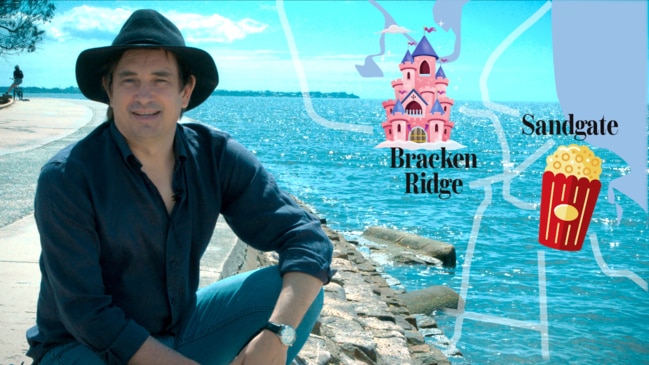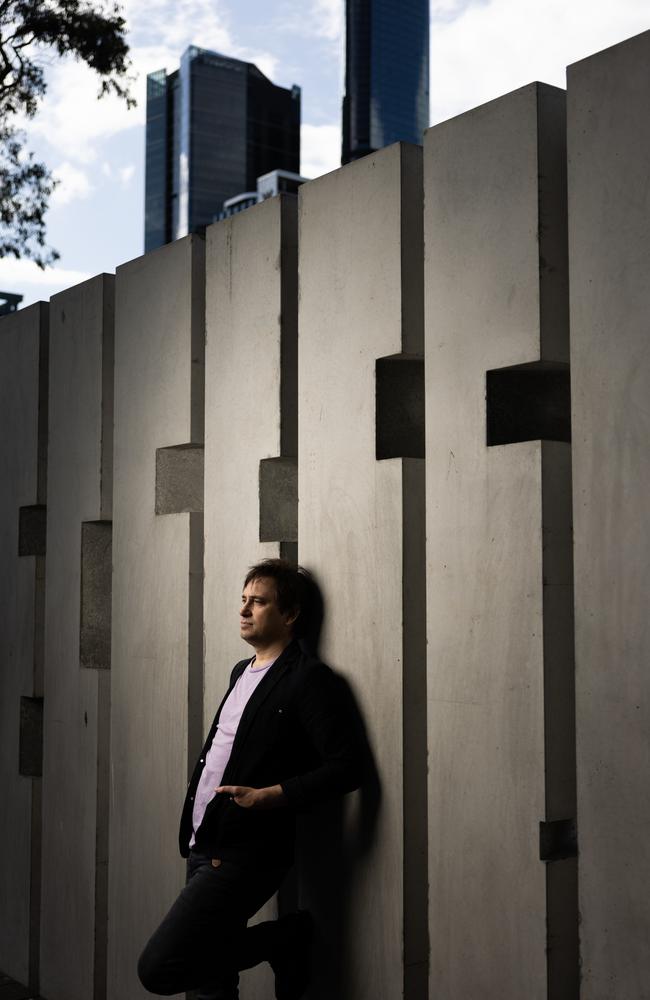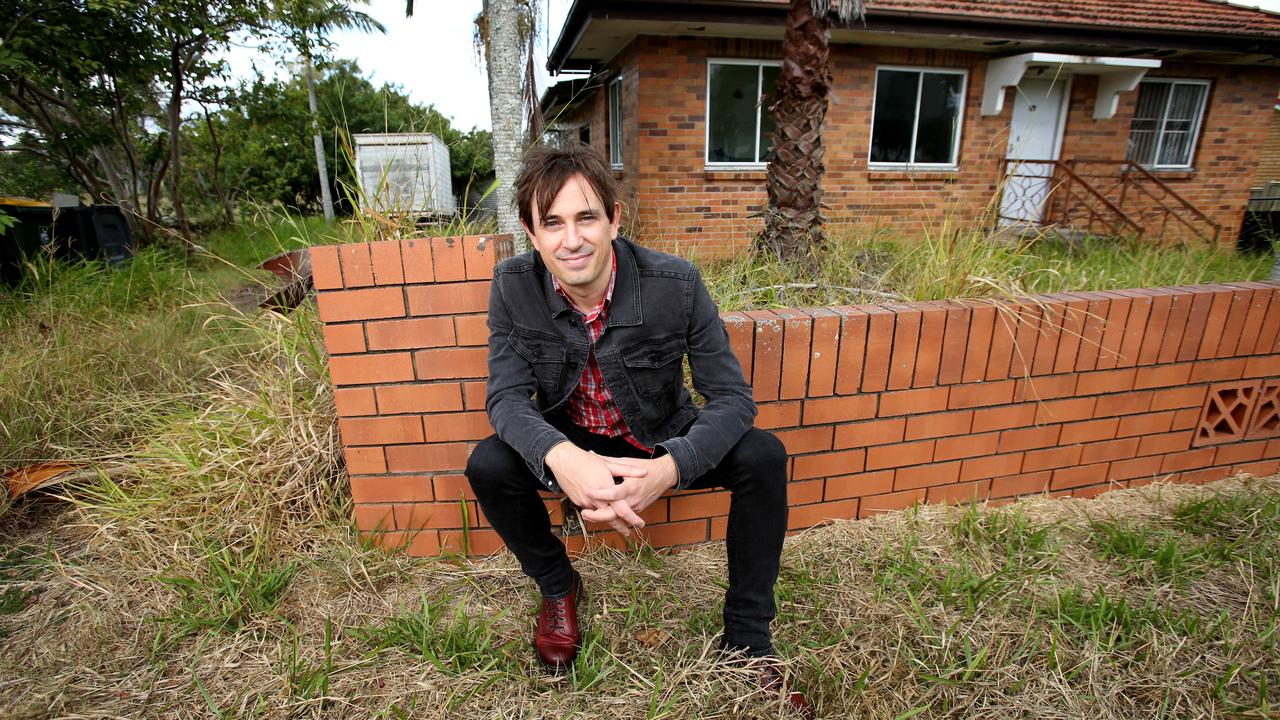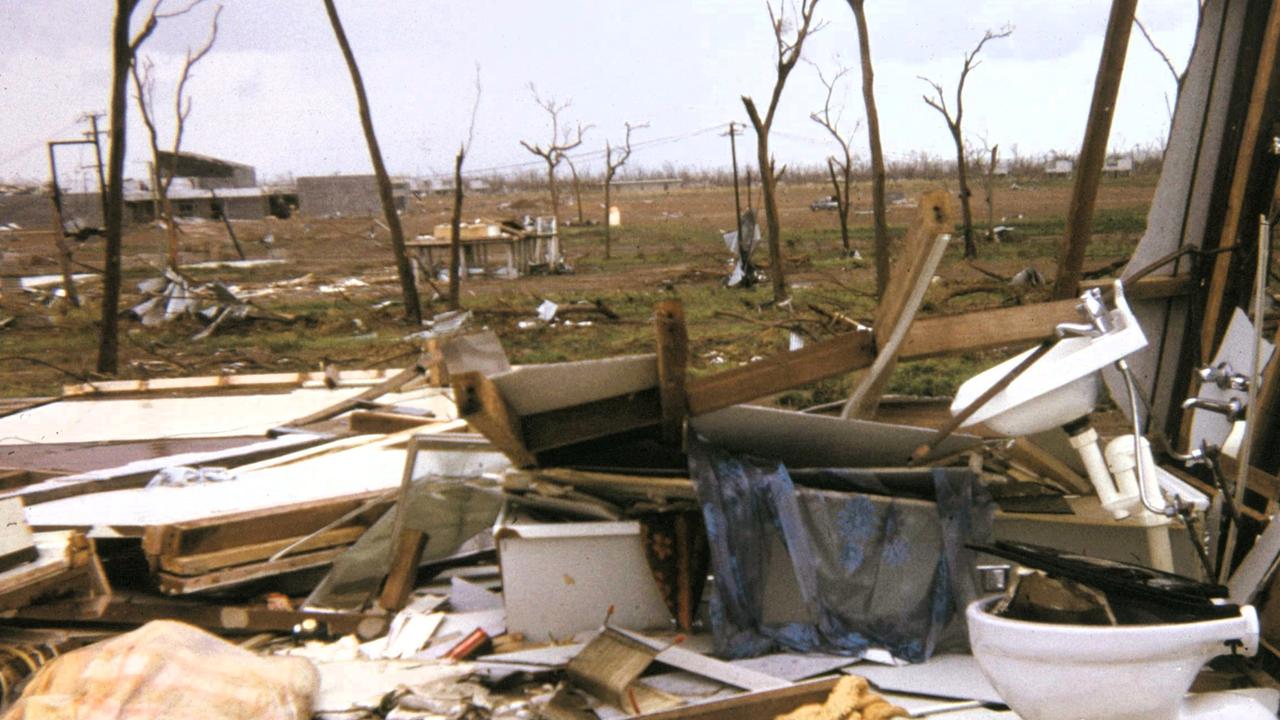‘The moment everything changed’: Bestselling author Trent Dalton on self doubt and how his wife saved him
Trent Dalton has revealed how he overcame his own inner critic to succeed as an author, and the huge influence his wife and family had in turning his life around.

Lifestyle
Don't miss out on the headlines from Lifestyle. Followed categories will be added to My News.
A boy looks in a mirror, its ornate curves and carved fretwork at odds with the room it sits in.
He studies his face, peers into the glass where he can see beautiful things, hopeful things. Maybe one day, he will play footy for Queensland. Maybe he will become a lawyer, or an archaeologist listening for ancient whispers.
The boy grows older, and he starts to see things in the mirror differently. Starts to see his future differently. All the beautiful things, the hopeful things start to fade. The boy, now a teenager, looks into the mirror and sees only ugliness.
Years later, the boy is speaking at an event at the Youth Advocacy Centre in Brisbane, where someone asks him, “What would you do to solve youth crime?” He knows he doesn’t have the answers to this deeply complex question, but he thinks he knows one of them.
Trent Dalton clears his throat and answers: “We need to change what those boys are seeing in the mirror.”

These days Dalton is a married, 44-year-old father of two daughters, and a world – some might say a universe – away from the brick, public housing shoebox where he grew up in Brisbane’s Bracken Ridge.
An internationally best-selling author (Boy Swallows Universe, All Our Shimmering Skies, Love Stories) his first book also has been crafted into a highly anticipated Netflix series and a smash-hit stage adaptation.
There are few writers who have achieved the heady levels of success Dalton has, but while his fortunes have changed considerably, the people who matter most to him, and those he knows best, have not. They are never too far away from him. Knocking at his door. Beating in his heart. Finding their way into his stories.
“When I was asked that question about youth crime, I guess I could only reflect on my own experience about what I saw growing up.
“In the room I shared with my brother, we had this ridiculously ornate mirror my dad got from Lifeline, it was so out of place with what was going on outside it. I’d look into it and see this outline of what you might be, but the outside world starts getting in, and all those images of your future self getting uglier, and you start not wanting to come home because what is at home is so disturbing. My old man, who I loved with all my heart and soul, in his room drinking and reading his books and my mother is battling her own demons somewhere else and I’m looking at my own face and thinking, ‘Why can’t I solve this? Why can’t I make things better for us?’ And then that becomes, ‘F--k you, and f--k the world’.”
Dalton briefly closes his eyes.
“So I get it, I get the anger of those young men, the nihilism.”
But then, as tends to happen with Dalton and his dream factory of a mind, other possibilities open, and other worlds beckon.

“So, you’re looking in the mirror and you don’t like your past, and you don’t like your present and you can’t see a future but what if you still caught a glimpse of something in all of that? What if what you saw in the mirror was amazing? What if it showed you a way out?”
That’s the question at the heart of Dalton’s soon to be released fourth book, Lola in the Mirror, a modern day, enchanting Grimms’ fairytale of a read, from its opening pages invoking a famous (if a little skewed) storybook question.
“Mirror, mirror on the grass. What’s my future, what’s my past?”
So begins Dalton’s latest tale, as a young, homeless girl stares into a cracked, but ornate mirror lying on the ground of the disused scrapyard where she lives with her mother.
By the brown snake of the river, in Brisbane’s West End, their home is a van with four flat tyres. They have been on the run and on the move for 16 years from their past and the monsters who dwell in it. The girl has no name – it’s safer that way, her mother advises – and as in all the best fairy tales, the forces of good and evil wrestle to claim her throughout.
“When I think about it, that’s the start of all my writing in some ways,” Dalton says.
“Someone has to find their way out of a situation, like those two kids in Hansel and Gretel left in the forest by the woodcutter. Like Red Riding Hood. What’s going to save them? Who will help them? For me, writing Lola was like that.”
He smiles, then adds, “So, what if the city itself was the enchanted forest? What if the forest began from about the start of Central Station, down to the phone box on the corner of Adelaide St? Let the City Hall be your castle, let the Victoria Bridge be your place of romance. You will have your trolls, you will have your fairy godmothers, but ultimately the only person who can really save you is yourself.”
So too, for the girl in these pages, traversing her way on a yellow pushbike through a gritty and perilous landscape. Her allies are the invisible people who dot all our city’s streets. There’s her best friend Charlie, a homeless, alcoholic teenager with a soul as sweet as an ice cold rum and Coke. There’s the scrapyard’s den mother Mary, who cooks for the people who live there, and tries to sate her own demons with sugar.

There is also a scene in the book when the girl passes a man sitting behind a desk on the corner of Albert and Adelaide streets. There is a sky blue Olivetti typewriter perched on it and he is asking people to tell him their tales of love.
Those who read Love Stories will know it is a glimpse of the real-life author of the book, the place where Dalton sat doing just that for two months in 2021, collecting the tales that would ultimately fill its pages. Does he see the girl too?
Dalton shakes his head. “No, I thought about it, I kind of wish he did, but thought no, because we all don’t see her. That scene is clearly me writing Love Stories, and meanwhile this girl is neck deep in her own love story, one of the craziest, wildest love stories, but he doesn’t see her, and in a way that’s also the point of the whole book – look who we miss out on.
“But when I was writing that book, and collecting all those stories, I’d be setting up in the morning, as all the night people were coming out of their hidey holes and we’d talk. And I thought if I am going to write this book, this love story, then I’m going to populate it with all these people I met doing that.
“They are all real life people; the military tank driver who lost his eye, starts drinking, and ends up on the streets, the guy who against all odds gets clean, but goes off the rails. And Charlie Mould. I’ve met Charlies, and I am Charlie. He’s me, because there’s no way now that my father could have raised me and my brothers, four boys in a house that cost less than $100 a week. With rentals the way they are, there are so many people a breath away from being a Charlie.

“So where do they go? We wring our hands and say what can we do.” Dalton’s eyes flash. “We build more public housing, that’s what we do.”
Dalton is well acquainted with life on the streets for the city’s homeless.
As a journalist for this magazine and others, he wrote several, award-winning features on the subject. Along with his good friend, photographer, David Kelly, he spent 10 years documenting the people who visited a centre in Brisbane’s Fortitude Valley formerly known as the 139 Club, now called 3rd Space, and brought to life in Lola in the Mirror as The Well.
For the past 50 years the centre has helped those living on the street or at risk of homelessness. It is a day drop-in centre offering hot meals, showers, help with medical, mental health and employment services.
In 2012, Dalton and Kelly created a book, short film and art exhibition titled Detours: stories from the street, highlighting its work and its people.
“We called it Detours because you talk at any length to people on the street and 90 per cent of the time they have experienced a moment of genuine trauma of some kind that has changed the course of their lives, a detour of some kind from where they should have gone, to where they ended up, and they are all in Lola in the Mirror too. I cannot stress enough how much is true, like the character of Esther in the Hole.

“We met the real-life Esther. She said come back to my home, and we went there and there was a crack in the wall you slipped through, and that is where she lived, in the earth behind it.”
Lola in the Mirror bears witness to all these people, the ones who live in the walls, in nooks below arching trees, or underneath bridges because they either have no home, or the home they have offers no loving arms, no safety.
Domestic violence stalks the pages of Lola, illustrated throughout by Sydney artist Paul Heppell. The first image in the book is a pen and ink drawing of a man in a business suit with a Tyrannosaurus’s head instead of a human one. In a domestic kitchen, he blocks the way of a much smaller woman. It is titled the Tyrannosaurus Waltz, and it is danced,
Dalton says, in homes all over Australia, all over the world.
Dalton has written about domestic violence too, in his journalism, and he has seen it with his own eyes. “So when a woman is experiencing domestic violence, her primary issue is just surviving. My mother is such a f--king hero to me, that woman has been half dead, she has danced that waltz.” He shakes his head.
“It always starts in the kitchen, in the heart of the house. I called it the Tyrannosaurus Waltz because when you are a kid, that is how you see them. Their darkness makes them taller, it enlarges them, and they stomp and they growl, and they are like tyrant lizards, like monsters. And the woman dancing that terrible dance is so strong and so delicate.”
Dalton is shedding salty tears for that woman, and all the women in all the kitchens, trying to sidestep a monster.

Dalton has sidestepped a few monsters of his own, and he has had his own Detour moment. But his was the best kind, the kind that took him not to a darker place, but one filled with light.
“My detour moment for the best, the upside moment, the moment everything changed was meeting Fiona (Dalton’s wife). She gave me my two girls, and she gave me a place where facing myself in the mirror got a whole lot easier.”
And while these days he likes what he sees there, he says, like all of us, he still has his moments.
“It’s a very human thing to do, kind of berate yourself in the mirror, isn’t it? In my deepest, darkest moments, you wouldn’t believe the things I’ve said to myself. You know, ‘You’re a f--king idiot, why would you say that, why did you do that’, those moments when you’re just full of self-loathing. I can be pretty terrible to that guy in the mirror sometimes.’’
Part of the reason Dalton is such a good writer is that he is also a searingly honest one. He readily admits he is broken in all of the ways most of us are.
At the end of the interview, we talk a little more about how all of us – international best selling authors or not – are self critical, and I wonder if he has ever told that boy in the mirror that he loves him.
He says no, and I suggest maybe it might be a good idea, sometime. I don’t really know why I suggest this, except perhaps in all the love Dalton spreads in this world (if you have met him, or attended one of his book events, you will know what I mean) I wonder if he should sprinkle a little of that joy on himself.
Later that night, he sends a text.
“Hey, by the way, I tried what you said. I said those words in the mirror. I said I love you. Then something beautiful happened. The bloke in the mirror said them back to me.”
More Coverage
Originally published as ‘The moment everything changed’: Bestselling author Trent Dalton on self doubt and how his wife saved him








